Electric Cars
The age of the electric car is certainly feeling like it's closer than ever, with record sales of electric cars in recent years. There's also the promise of plenty more brand new models arriving over the next 12 months, so you definitely aren't alone if you're considering making the switch to an EV.
Along with the introduction of tougher restrictions upon petrol and especially diesel-powered cars, like London's ULEZ and other clean air zones, plus high fuel prices that show no signs of dropping, the desirability of electric models is becoming stronger by the month, but are they really an option for the average driver?
Eventually, you won't have much of a choice, given the Government's plans to ban the sale of new petrol and diesel cars by 2035. But for the time being at least, there is still time to deliberate a little more over your options, and that's good because the electric car market has changed a lot in recent years.
While models like the Nissan Leaf and Renault Zoe have made https://www.buyacar.co.uk/cars/electric-carsEV motoring more mainstream and have evolved to offer over 200 miles of range, there's also a new generation of 300-mile plus, rapid-charging models.
Earlier cars are more affordable to buy or lease, while the latest electric cars can be pricey, but offer staggeringly low running costs in return, especially if you're on an EV tariff with your energy provider.
.jpg?width=400&height=225&format=webp)
Best used electric cars 2024
As electric cars become more commonplace, there’s a wider choice of second-hand models available. Here’s our pick of the best used electric cars right now
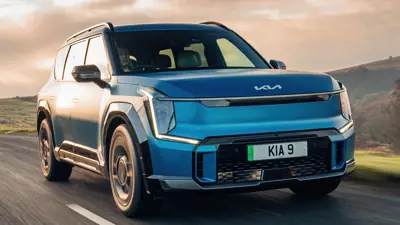
Best electric SUVs 2024
SUVs have led the electric revolution. Here are 10 of the best electric SUVs that you can buy today.
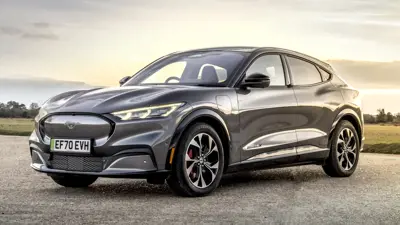
Longest range electric cars 2024
Ready to buy an electric car, but worried about how far it will go on a charge? Check out the longest range electric cars that can all cover more than 300 miles per top-up
.jpg?width=400&height=225&format=webp)
Cheapest electric cars 2024
Want to go electric without breaking the bank? Here are the 10 cheapest new electric cars on the market
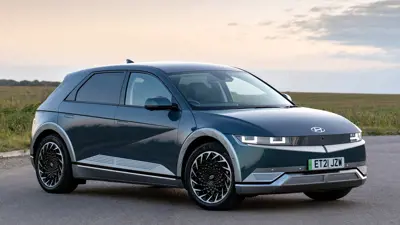
Best electric cars 2024
Tax free, green and cheap to run... here are the best electric cars you can buy right now.
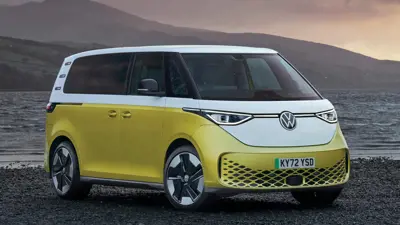
Best electric cars with seven seats 2024
If you need room for a large family or frequently ferry friends or kids around, a seven-seater makes sense. And there's a growing number of electric seven seaters.
.jpg?width=400&height=225&format=webp)
Best small electric cars 2024
Perfect for urban use, the best small electric cars are fun to drive and stylish. Here are our top 10 buys.
.jpg?width=400&height=225&format=webp)
Best electric family cars 2024
The market for family-sized electric cars has boomed in recent times, with more options than ever for buyers. Here are 10 of the best.
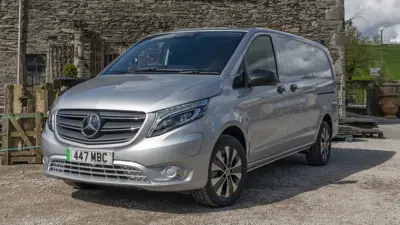
Best electric vans 2024
More and more businesses looking to carry out deliveries in low emissions zones are looking for electric vans. Here are 10 of the best you can buy right now.

Fastest electric cars 2024
Electric cars might not make V8 noises, but they can be blisteringly quick. Here are 10 of the best ‘everyday’ EVs that allow you to plug-in and play.
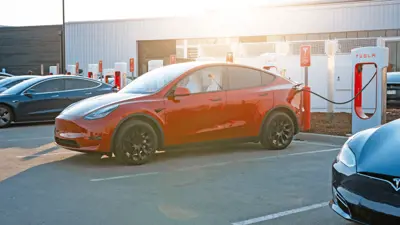
Electric car charging points explained
Confused by the many electric car charging station types and how they work? Read on for info on charging speeds and tethered charging
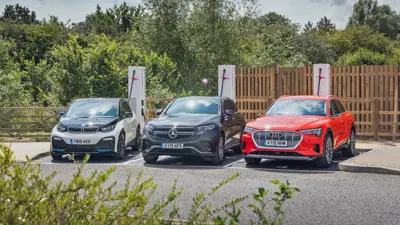
Electric car charging cables and connectors explained
Cables and charging systems for electric cars can be confusing. Here’s our guide to help make fast charging as easy as possible
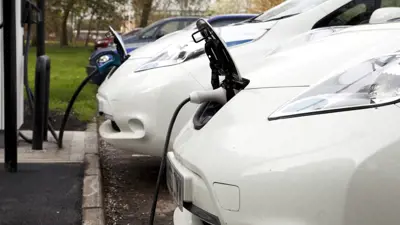
How much does it cost to charge an electric car?
Slow chargers, fast chargers, and rapid chargers; read on for our guide to charging an electric car
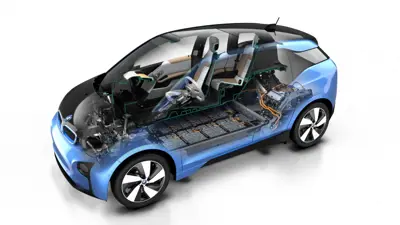
How long do electric car batteries last?
Worried about how long electric car batteries last? All car makers offer battery warranties. Keep reading to find out which protect you best
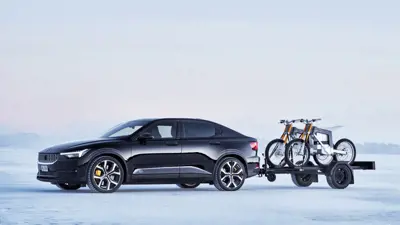
Electric car towing capacity: can you tow a caravan with an electric car?
Wondering whether you can tow with an electric car? And how do EVs compare with petrol and diesel alternatives? Keep reading for answers
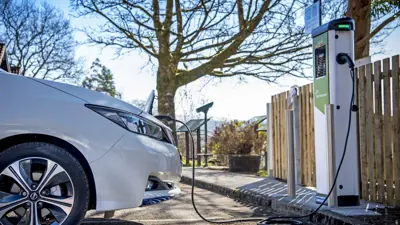
Free electric car charging and where to find it
On the hunt for free electric car chargers but don’t know where to find them? Read on to discover where to look to cut your charging costs
Is it worth buying an electric car?
The fact that electric cars now have a greater range between charges is a huge boon to the market, as the 'range anxiety' which was once a dealbreaker for a majority of customers is now less of a problem. Not to mention the numerous financial benefits that come from driving an EV, including road tax exemption (for the time being), lower running costs and free entry in low emissions zones.
EVs are quieter, cleaner and genuinely enjoyable to drive. Prices are beginning to come down, as more affordable models like the Peugeot e-208 and Vauxhall Corsa-e are now readily available on the used market. They might be cheap in electric car terms, but they are typically still more expensive than their combustion-engined equivalents, the Peugeot e-208 in particular costs around £7000 more to buy new than a petrol 208 model.
Find a used electric car for sale
What are the benefits of an electric car?
No road tax (for now...)
Zero emissions cars (even those costing more than £40,000) are currently exempt from paying road tax, although this will change in 2025. Currently, electric cars are exempt from both the annual £165 standard rate VED and the £335 premium supplement (also known as the 'expensive car supplement') for new cars with a list price of £40,000 or more.
Under the new rules new zero emission cars registered on or after 1 April 2025 will be liable to pay the lowest first year rate of VED (which applies to vehicles with CO2 emissions of 1g/km to 50g/km) currently £10 a year. From the second year of registration onwards, they will move to the standard £165 rate. The Government also intends to tax older electric vehicles, with those first registered between 1 April 2017 and 31 March 2025 set to pay the standard rate.
Lower company car tax
The biggest tax benefits are offered to business car drivers. Electric cars are subject to the lowest Benefit-in-Kind (BiK) rate of company car tax, which can save more than a thousand pounds per year compared with a petrol or diesel car. Company car tax rates for EVs tumbled in April 2020 when the BiK rate for EVs was cut from 16% to 1% for the 2021/22 tax year and 2% for the 2022/23. This means that you'll pay tax on just 2% of an electric car's list price, compared with around 30% for a mid-range petrol Volkswagen Golf.
Not paying emission zone charges
Electric cars are exempt from clean air zone charges such as London's Ultra Low Emission Zone (ULEZ), which was introduced in April 2019, but was expanded to cover a much larger area up to the M25 in October 2021.
Is it expensive to charge an electric car?
A full charge overnight at your home can cost around £3.00 if you're able to get a cheap off-peak tariff. That’s just a fraction of what the petrol would cost for that distance. Research carried out by the AA, for example, shows that electric car owners who charge at home using off-peak electricity can cut the running costs of their car to about 2.5p per mile compared with around 16p per mile for a petrol car.
Fast public chargers can seem expensive. For example, Ecotricity charges 30p/kWh of energy used. This is more than you'll pay for energy at home (on a tariff geared towards EV drivers charging at night), but this is for a high-voltage charger, which can charge the battery of some vehicles to 80% of its capacity in less than an hour.
Tesla's Supercharger charging posts are impressively fast, comprehensively located and reliable, as well as being free to use for many owners of older Model X and Model S vehicles.
If you opt for an electric car and have off-street parking the ideal solution is to install a charging point at home. These are offered in either slow (3kW) or fast (7kW) power ratings. A 50kWh battery (similar to what you'd find in a Renault Zoe, Vauxhall Corsa-e or Peugeot e-208) will take around 16 hours to top up on a 3kW charger, or just over seven hours with the quicker 7kWh charger.
Find a used electric car for sale
Whichever option you choose, a qualified electrician will need to conduct a survey to make sure your wiring can handle the load.
There are also public charging points that allow you to top up when you’re travelling long distances. These range from slow chargers to rapid chargers, the latter able to offer up to an 80% charge as little as 30 minutes, as long as your car is compatible with such high speeds.
Some public chargers require you to sign up to a subscription service or open an account with the charging services you’re most likely to use. If you live in London, for example, and have no off-street parking, you’ll need a subscription with Source London, which has a network of 7kW chargers.
BP Pulse's (formerly Chargemaster) network has the most chargers around the country – in the region of 8000 – which can be accessed using a smartphone app (which you have to pre-load with credit) or you can pay a monthly subscription, and some of its chargers then become free to use. Some of its newer chargers are also available with tap and pay.
One network that doesn’t require membership or an app is Instavolt, which accepts payment using a contactless card. This is the future – it's the model found in many European countries – but until all the providers agree to accept payments this way, we will continue to need a number of apps on our phones.
You can be unlucky and either find a non-electric car parked by a charger (the EV community calls this being 'ICEd' - or Internal Combustion Engined), or another one using it. Another drawback is that, while some points may have CCS, CHAdeMO and AC cables, only one can be used at a time.
If you visit the appropriately named Zap-Map website, you’ll be offered more than 25,000 locations for charging – you can search for the nearest site with a charger compatible with your EV.
